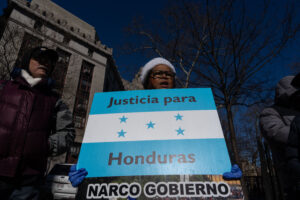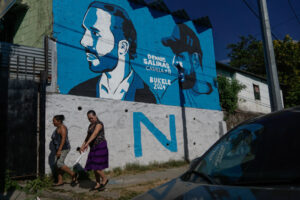By Francesca Lessa, Marie Skłodowska-Curie Research Fellow, Latin American Centre, University of Oxford, UK, and Jo-Marie Burt, WOLA Senior Fellow and Director of Latin American Studies, George Mason University
From October 23 to 27, during the 165th period of hearings of the Inter-American Commission on Human Rights (IACHR) in Montevideo, Uruguayan human rights activists launched a social media campaign to denounce impunity for crimes committed during Uruguay’s dictatorship (1973-1985). Trending under #26OCT and #NoHayDerecho (We lack rights), the campaign highlighted the fact that, more than 30 years since the end of the dictatorship, many victims are still awaiting justice, an extensive delay that constitutes a new violation of their rights. Videos with powerful victims’ testimonies have circulated recently on Twitter and Facebook. On October 26, a large gathering took place at Montevideo’s emblematic Libertad Square under the banner “la justicia cuando tarda no es justicia” (justice delayed is justice denied).
Against the backdrop of the campaign to bring an end to impunity for dictatorship era crimes in Uruguay, a new ruling by the country’s Supreme Court of Justice marks a major setback in the search for accountability. The Court’s sentence, which is dated September 25, 2017, but was only made public a month later, relates to allegations by “A.A.,” a woman from the city of Tacuarembó, who claims that in 1972 she was subjected to illegal detention and torture. The Court’s September 2017 ruling, in a split 3-2 vote, accepted the defense’s claim that the crimes committed did not constitute crimes against humanity at the time and are therefore subject to statutes of limitations. The new ruling rehearses arguments from a February 2013 Court ruling that articles 2 and 3 of Law 18.831, passed in October 2011, are unconstitutional.
Law 18.831 had established that no statute of limitations or other legal instruments, such as the Expiry Law, should be applied to investigations of human rights violations committed during the dictatorship, and that such violations constituted crimes against humanity in line with human rights treaties ratified by Uruguay. After more than two decades of impunity under the Expiry Law of 1986, the approval of Law 18.831 had been hailed as a crucial step forward in meeting the demands of survivors and relatives of victims for truth and justice.
For more than 20 years, under the aegis of the 1986 Expiry Law, perpetrators of systematic human rights violations committed during the Uruguayan dictatorship enjoyed complete impunity. A sustained campaign by human rights activists, which began the very day after the Expiry Law was enacted in late 1986, culminated with Law 18.831 in 2011, derogating the amnesty for human rights violators that was provided by the 1986 law. But despite the end of legal impunity, new forms of de facto impunity—including the use of statute of limitations arguments and unjustified delays in the courts—have continued to shelter perpetrators from facing justice.
One of the tools that has been used to preserve de facto impunity is the February 2013 Supreme Court decision, which the September 2017 ruling reaffirms. The latest decision contends that the rules overriding statutory limitations for crimes against humanity cannot be applied to the case of A.A., given that the laws incorporating those provisions into national law had been enacted after the commission of the crimes in 1972. Invoking the principles of non-retroactivity of criminal law (ex post facto), the Court declared articles 2 and 3 of Law 18.831 to be unconstitutional.
According to Uruguayan law, Supreme Court decisions on constitutional questions do not set precedents and each ruling is thus applicable only to the case under consideration. As a result, judges have had to tackle this same question in numerous cases, resulting in divergent and even contradictory jurisprudence depending on the composition of the Supreme Court at different moments. In 2013, the Court’s verdicts applied the statute of limitations to the crimes of the dictatorship. In 2014 and 2015, jurisprudence shifted in favor of the non-applicability of statutory limitations, in line with Uruguay’s international obligations. With this most recent verdict, the Court has returned to its 2013 stance.
Our critique of the earlier 2013 sentence still stands and applies to the September 2017 ruling as well, since this latest sentence reproduces those same arguments. Both rulings make a selective use of human rights provisions, ignoring the rights of victims, the international obligation of the Uruguayan state to sanction human rights violations, and focusing solely on the rights of those accused of carrying out torture, murder, and enforced disappearance. The majority ruling makes no mention of the well-recognized rights to truth, access to justice, and reparations of the victims and relatives of victims of the dictatorship. The ruling cites obscure and superseded criminal codes from Tuscany and Italy of 1853 and 1888 to justify its stance, even referring to principles of Canon Law dating back to 593. The sentence makes no reference to international criminal law and international human rights law that has developed since the 1945-1946 Nuremberg trials.
The dissenting opinions of Judges Felipe Hounie and Bernadette Minvielle are in line with provisions under regional and international human rights law. They recognize the category of crimes against humanity and assert that during the Uruguayan dictatorship it already constituted a jus cogens norm (meaning an overriding principle of international law, from which no derogation is permitted). Judge Hounie cites extensively a 2014 verdict, in which Judge Fernando Cardinal had argued that the category of crimes against humanity dated back to the Nuremberg Tribunal and to the 1968 Convention on the Non-Applicability of Statutory Limitations to War Crimes and Crimes Against Humanity. Thus, such jus cogens norms already existed at the time of the commission of the crimes in Uruguay and there was no need of subsequent legislation.
The sentence in the A.A. case, like the 2013 ruling before it, constitutes a remarkable departure from jurisprudence on human rights both regionally and internationally. Chilean and Argentine lawyers we consulted on the matter underscored that such debates no longer take place in their courts, as they were resolved years ago. In a December 2006 sentence, Chile’s Supreme Court determined that statutes of limitations were not applicable to extrajudicial executions during the dictatorship due to the primacy of international law (Rol 559-2004). In Argentina, likewise, the Supreme Court of Justice recognized in 2004 that the crimes committed during the last dictatorship amounted to crimes against humanity and, as such, their investigation could not be prevented by applying statutory limitations, reaffirming this stance in the emblematic Simón verdict one year later.
Uruguay’s back-and-forth on the question of the category of crimes against humanity and the non-applicability of statutory limitations does nothing to help investigations into past human rights violations. This erratic jurisprudence only plays in favor of continued impunity. Earlier this year, 13 human rights defenders and lawyers received death threats by the so-called Comando Barneix in a clear attempt to disrupt judicial investigations. Moreover, the work of forensic anthropologists conducting excavations in the search of the disappeared is regularly threatened and interrupted.
The Supreme Court’s September 2017 ruling has been criticized both locally and internationally. The Inter-American Court for Human Rights stated that it “regretted such a verdict” and highlighted it was contrary to Uruguay’s international human rights obligations.
The Court’s verdict puts Uruguay in breach, once again, of its international human rights obligations to guarantee truth and justice for victims.


